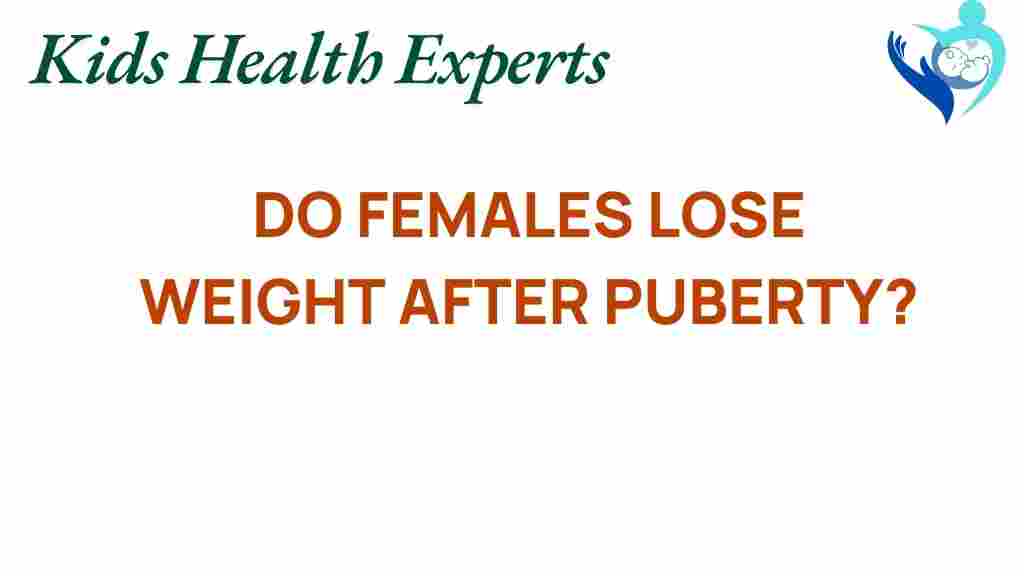Do Females Really Lose Weight After Puberty?
As girls transition from childhood to adolescence, they experience a myriad of changes that can affect their bodies, health, and weight. One of the pressing questions that arise during this critical phase of female development is whether females really lose weight after puberty. This topic is intertwined with various factors, such as metabolism, body image, health changes, hormonal shifts, and adolescent growth.
In this article, we will delve into the truth behind weight loss in females post-puberty, examining the biological, psychological, and nutritional aspects that play a role in this journey.
The Science Behind Weight Loss and Puberty
Puberty marks a significant period of change in a girl’s life, not only in terms of physical appearance but also in metabolic processes. Here, we will explore how these changes influence weight loss.
1. Hormonal Shifts
During puberty, females experience significant hormonal shifts, particularly in estrogen and progesterone levels. These hormones play crucial roles in:
- Regulating metabolism
- Influencing body fat distribution
- Affecting appetite and food cravings
These hormonal changes can lead to an increase in body fat percentage initially but may also set the stage for a shift in metabolism that can aid in weight loss later on.
2. Adolescent Growth and Development
Puberty is characterized by rapid physical development, including an increase in height and changes in body composition. During this phase:
- Girls tend to gain muscle mass, which can increase metabolism.
- The body naturally redistributes fat, often leading to a more curvaceous figure.
As the body grows and develops, it may influence weight management. Understanding these changes is crucial for promoting a positive body image.
3. Metabolism Changes
Metabolism refers to the processes your body uses to convert food into energy. During puberty, metabolic rates can fluctuate due to:
- Increased muscle mass from physical activity
- Changes in hormonal levels
- Growth spurts that demand more energy
These factors may lead to weight loss in some females, especially if they maintain a balanced diet and engage in regular physical activity.
As girls undergo these changes, their perception of body image can significantly impact their mental health and self-esteem. It’s essential to address the psychological aspects of weight loss during this time.
1. Positive Body Image
Encouraging a positive body image is critical during puberty. This includes:
- Fostering self-acceptance and appreciation for one’s body.
- Recognizing that bodies come in different shapes and sizes.
- Understanding that weight is not the sole indicator of health.
Promoting a healthy body image can support emotional well-being and reduce the risk of eating disorders.
2. Nutrition and Healthy Eating Habits
Nutrition plays a pivotal role in weight management during puberty. A balanced diet can support healthy growth and development. Key components include:
- Fruits and Vegetables: Essential for vitamins and minerals.
- Whole Grains: Provide sustained energy and fiber.
- Lean Proteins: Important for muscle development.
- Dairy or Alternatives: Source of calcium and vitamin D for bone health.
Establishing healthy eating habits during puberty can lead to better weight management and overall health.
Step-by-Step Process: Supporting Healthy Weight Loss Post-Puberty
If you’re a female navigating weight loss after puberty, here’s a step-by-step guide to help you along the way:
1. Set Realistic Goals
Focus on achievable goals rather than perfection. Aim for gradual weight loss, as rapid changes can be unsustainable.
2. Monitor Nutrition
Keep a food diary to track what you eat. This can help you identify patterns and make healthier choices.
3. Stay Active
Incorporate regular physical activity into your routine. Aim for at least 150 minutes of moderate aerobic activity each week, along with strength training:
- Walking, running, or cycling
- Sports or dance classes
- Yoga or Pilates
4. Focus on Hydration
Drink plenty of water throughout the day. Proper hydration can help control appetite and support metabolism.
5. Seek Support
Consider talking to a healthcare provider or a nutritionist. They can offer personalized guidance and support tailored to your needs.
Troubleshooting Common Challenges
Despite your best efforts, you may encounter challenges along the way. Here are some common issues and how to address them:
1. Plateaus in Weight Loss
If you hit a plateau, consider adjusting your exercise routine or caloric intake. Sometimes, your body needs a new challenge to break through a weight loss barrier.
2. Emotional Eating
Many girls experience emotional eating, especially during stressful times. Try to identify triggers and find healthier coping mechanisms, such as:
- Engaging in physical activities
- Practicing mindfulness or meditation
- Talking to friends or family about your feelings
3. Peer Pressure and Social Media Influence
In today’s digital age, social media can heavily influence body image. Surround yourself with positive influences and remember that everyone’s body is unique. Limit exposure to content that promotes unrealistic body standards.
Conclusion
In summary, the question of whether females really lose weight after puberty is complex and influenced by various factors, including hormonal shifts, metabolism, nutrition, and body image. While some girls may experience weight loss during this period, others may not due to the numerous changes occurring in their bodies. A focus on health rather than weight alone is essential.
By understanding the dynamics of female development, embracing healthy habits, and fostering a positive body image, females can navigate this transformative phase with confidence and well-being. Remember, it’s not just about weight loss; it’s about achieving a balanced and healthy lifestyle.
For more information on female health and nutrition, check out this resource.
Also, feel free to explore this link for more tips on managing adolescent growth and development.
This article is in the category Growth and created by KidsHealthExperts Team
